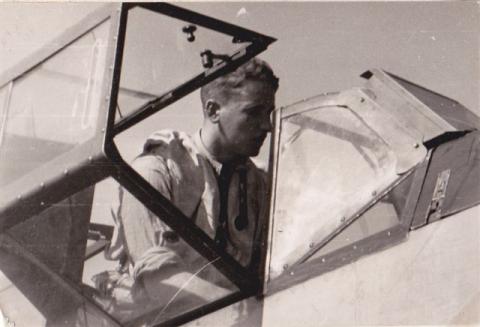Leopold Wenger's letters from France, May-December 1941
- 3303 reads
'Poldi in Brest, France, 1941, in his Me 109
copyright 2013 Wilhelm Wenger and Carolyn Yeager
Translated from the German by Markus
Continued from Jan-April 1941
1 May 1941: [Still in the city of Cherbourg] Drunk sailors are found in all corners today because it is a common holiday. I used this free afternoon to thoroughly sleep myself out because where we live, and get up at 5 a.m. for emergency service which lasts until 10 p.m., drastically gets on one's nerves. Then the commuting from the city to our squadron location takes another half hour. I will be happy whenever I can go back to my squadron, which is heading further West.
How are my two little siblings doing? Is Gerhard still so terrible? [2 years old] Or has he gotten better? And Greterl [6 years old] ought to get her hair cut again, for then I will send her chocolate.
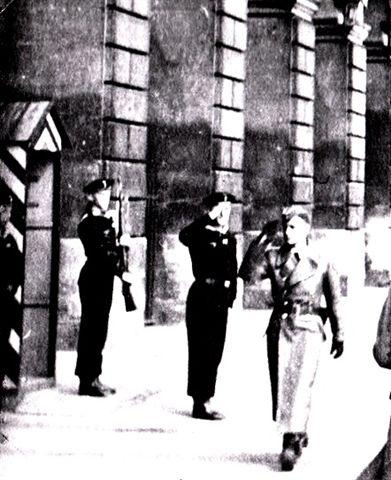 What did you say when you heard that I got promoted to lieutenant? It went quite fast. I was Oberfähnrich for only 12 days. I didn't even get a wage increase for being Oberfähnrich; a big lump sum will be paid all at once.
What did you say when you heard that I got promoted to lieutenant? It went quite fast. I was Oberfähnrich for only 12 days. I didn't even get a wage increase for being Oberfähnrich; a big lump sum will be paid all at once.
Right: Someone snapped this picture of Lieutenant Wenger being saluted as he walks past sentry guards on May 7, 1941 in France, wearing his long coat.
2 May 1941: On a recent night, I was surprised by a bombing while walking home from the cinema. I heard seven bombs howl and fall. They banged terribly and I had a bad feeling when one bomb after the other exploded closer and closer to me; You can imagine how I ran!
Today I was resettled into another hotel and have got a very nice room. I live right in the middle of the city next to the beach. [Cherbourg-East?]
9 May 1941: Yesterday, when I came back from Paris, I had received a lot of mail. Today I returned to my old squadron on a very slow train that took 11 hours! We are now even further to the West, but still on the Channel. I have again a nice hotel room with a bathroom (but there's no running water at the moment).
The landscape and town are more beautiful than I'm used to seeing so far in France. On the coast of Normandy it looked similar to how Dad had always described Dalmatia. Every small garden is walled in, for up there a steady wind blows. Here in Bretagne [Brittany], it rather looks like Eastern Styria from what I can tell from the train ride. Hilly, small valleys and streams, blossoming orchards. There's just one thing I don't like, and that's the cold. It just doesn't get really warm. Even when the sun is shining high in the sky, there is this cold breeze off the sea.
When I was in Paris I visited all kinds of attractions. I had already seen the Triumphal Arch in April, but I went up onto a roof from where I had a panoramic view of the whole city. I also flew over Versailles and landed close by. [Le Bourget?]
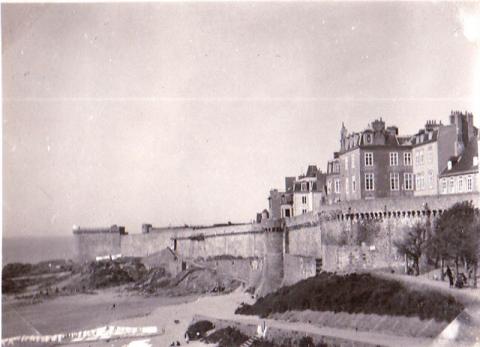
The beach at St. Malo in May, 1941
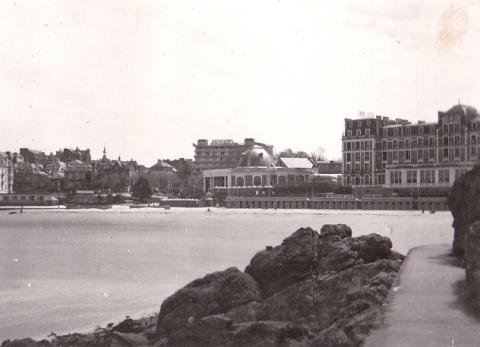
The close-by seaside resort of Dinard, May 1941
May 10th, 1941: Yesterday evening, I went for a little walk in the city [probably St. Malo], and I have to tell you, this is the nicest place I have stayed in France. It seems to have been an ancient fortress with old city walls, military towers, ring ditches [moats] and marvelous parks with beautiful plants. The chestnuts are blooming now and so are most fruit trees.
Yesterday, one of our sergeants shot down a Spitfire. Our Lieutenant Rudorffer, who just scored his 20th air victory, was mentioned in the Wehrmacht-report a few days ago. On May 1st he received the Knight's Cross.
25 May 1941: [Theville?] Two days ago, we moved again. I received Willy's outraged letter:
(I had already started with the SG38, the training glider, that is. I was in the seat, was instructed, and all of a sudden an incoming rain prompted the flight instructor to take me off the plane. My 130km bike ride to the airfield was in vain, and I had the same distance to go back. Note from W. Wenger)
I felt sorry for him because of his misfortune, but at one point he will get his turn flying also. Maybe he has already done his first starts by now as I'm writing.
I, as well, complain about bad luck lately, for firstly the tailor bungled my uniform so that I can't really wear it now. Because we had to leave so suddenly, I was forced to just take it with me and have it repaired by another Frenchman, if that is even possible. During a flight, something broke in my engine. Fortunately, I was very high over the Island of Jersey and able to glide back to my airfield. Only a few days later, I had an engine falure during a test flight. And yesterday, I had to land on an alternative field due to bad weather. There, a mechanic steps onto the wing, slips and trashes the landing flaps. It's not getting any crazier than that.
Over the last days, one of our squadrons sank a submarine and a 2.5 ton steamship. The submarine goes to the account of Lt. E. Rudorffer.
11 June 1941: After I came to Cherbourg from Dinard, I am in now in the westernmost West of France [Brest]. I've now flown over the Atlantic Ocean. I'm in a nice lodging again, right next to a park with palm trees and agaves, close to the shore. We have a small sailing yacht with an engine. But we don't use all this to its fullest, for there is just not enough time and motivation for it.
In the meantime, we've experienced more bombings. They dropped three right in front of our house yesterday. I saw one machine crash and burn. The Flak always gives us a nice fireworks display.
I am well enough; it's just that my bad-luck streak continues. I damaged the engine of my machine when rolling it; then a suitcase got lost during my last transfer [relocation].
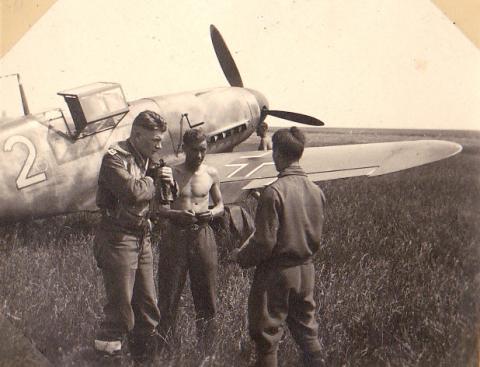
Lt. Wenger, on stand-by at Caen in early June, talks with Obergruppenführer Limberg (the big guy).
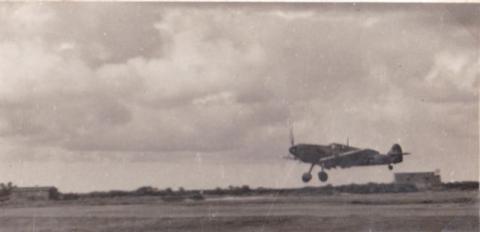
Landing an Me 109 - the most produced fighter aircraft in history with 33,984 airframes from 1936-April 1945
29 June1941: (Cazaux) Recently I was in Paris again and from there we drove on to Bordeaux the next day. I'm having a great time here at the moment. We are in an isolated place, close to a large lake. All around, there are only woods. The nearest village has a population of about 300. Nevertheless, it's very hot where we are, measuring 50-60° C daily. All the men were given tropical helmets. I had a tailor make a light uniform jacket out of tent fabric. Today, it was especially hot and so I'm running around in tracksuit pants almost the entire day. Our guards wear cloth-suits and white tropical helmets.
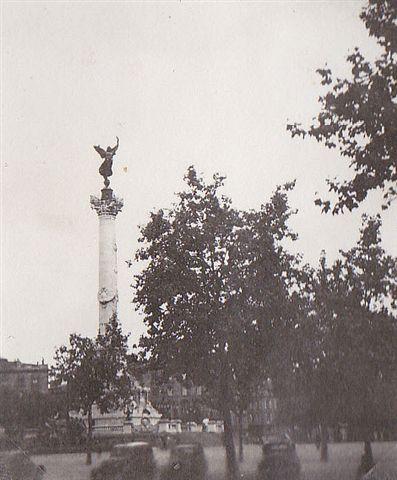
Bordeaux, France, June 1941
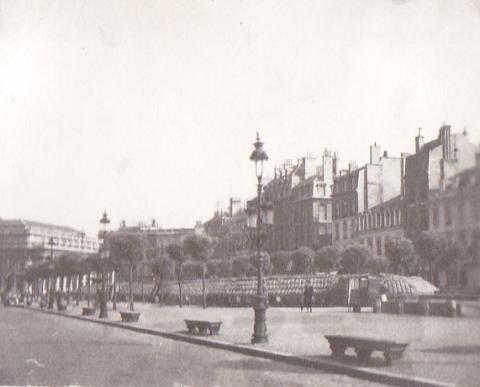
Place Gambella, Bordeaux 6-41
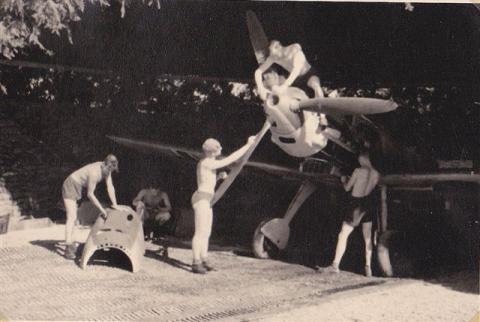
"Ground staff" at work in the intense heat at Cazau in Southern France, July 1941
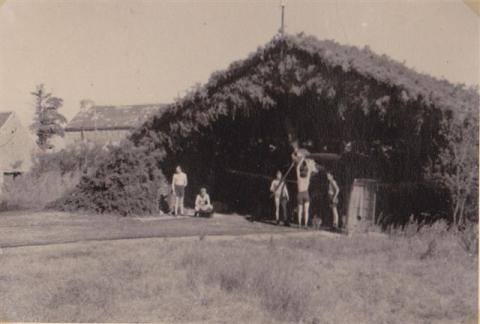
Technical service carried out under camoflaged hanger at Cazau
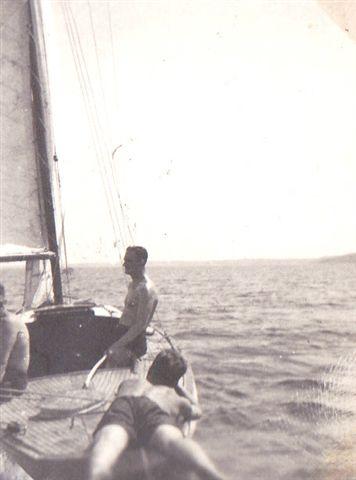
Right: There is also time for cooling recreation in Lake Cazau in their own sailboat. Temperatures reached between 50 to 60 degrees centigrade in July!
I was unlucky again yesterday! I wanted to take a sunbath after bathing. I laid down on the sand beach; a fresh breeze came from the Bay of Biscay and it was even pleasantly cool. I fell asleep and after about two hours woke up in pain, all burnt by the sun. It's difficult to walk today, so much does it hurt everywhere. There is no drinking water either. Brushing teeth is best done with bottled water. If we run out of that, then we use wine which we have in abundant quantities.
There is plenty of flying here, again. Our Commodore, Hauptmann Balthasar, has now made his 41st victory, for which he will probably receive the Oak Leaves.
This afternoon [a Sunday], a lieutenant and I from Horstkommando borrowed a pleasure boat and sailed in the fresh breeze. We had great fun, you just have to be very careful that such a big boat doesn't keel over in a strong wind..
July 3rd, 1941: Yesterday, I was at a seaside resort. At least there were more people. You should have seen the houses there; you would laugh! All of them are built very low, not one has a second story and everything is as small as toys, with all around little fences, or gardens with a few flowers in the sand. The streets with houses look like these comical half-Spanish houses that you have seen in pictures of Mexico. In general, an influence from Mexico is quite visible here. You notice this in all kinds of ways like the music, dwellings, lifestyle. For example, you will see bullfights. It's just not quite as flat as in Spain, according to the elderly matadors.
7 July 1941: Tonight, I am officer on night duty, and I sit in an office with a desk, a rug, a bunch of chairs and typewriters, telephone and cabinet. In a corner, there is my bike. It is still 35°C and I'm still sweating despite all of the easements. I have removed my tie but the thin canvas jacket is still too warm. It's 23 hours [11pm], I put some bottles on the water pipes to cool them, they are still lukewarm but nothing can be done. Today was very warm again, even though the record heat of 62°C was not beaten, thank God. I spent two hours this afternoon in the lake, then at the beach. There, the sun is not so unbearable.
If Willy really wants to fly by commercial airline, then he can happily have 50RM from me.
Yesterday, I had another wonderful excursion on our sailing yacht. It's great fun and it cools one off in this heat.
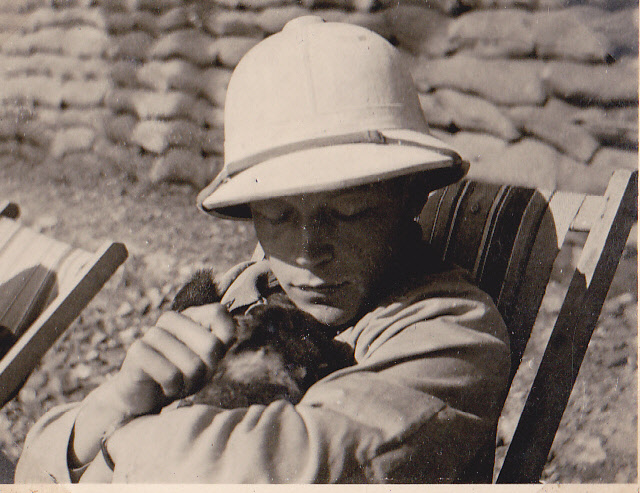
Unteroffizier Deinzer with a puppy, and wearing the white tropical helmet issued for the heat of southern France
19 July 1941: (Cherbourg-East) Yesterday, I took off from Southern France, Cazaux to Tours, 370km. Later from there to Le Havre, 240km and in the evening back to Cherbourg-East, 120km. I have lately been flying a lot through France. I was in Paris twice, and in Le Havre, Tours, Romilly, partially by train, or with my Me [Messersmitt].
July 28th, 1941: A few minutes ago, after an alarm, I had the wide expanse of the Atlantic Ocean in front of me and the Channel beneath me. Unfortunately, as so often, there was no contact with the enemy.
I saw aerial combat for the first time since getting back to the Channel front. Unfortunately, I wasn’t with my squadron, but I’m back with them again now. I’ve only been in two large-scale attacks, in
which I got into a few dogfights and came under anti-aircraft fire. Together with another plane, I flew straight into a swarm of enemy planes, where there was a lot of confusion and everybody was shooting at everybody else. I inflicted some serious damage on a Spitfire from a far distance, just as he was getting ready to shoot up one of ours. The Tommy started smoking very badly, and when I landed I could still see the splashes of oil from the Tommy machine on my own; he also splashed up the cabin of another plane of ours. The Englishman was long gone in a steep nosedive: I went after him as doggedly as I could, but I couldn't get close enough and so he escaped. But he certainly never reached home in that plane of his, because it was all shot full of holes. I didn’t have a single direct hit on my machine.
We have now got a little coati ("hog-nosed raccoon") from the Berlin Zoo. It's really fun to watch what this little fellow is doing. We also have a few dogs here now, it's a pure menagerie.
31 July 1941: This afternoon, we got quite elegant cakes and even a real torte as a snack. We have a driver who is a professional butcher, but he can bake delicious tortes with the most beautiful ornaments. The rations have become much better since the time of deployment has started. So we are all very satisfied now. If we got a few hours more sleep, we would be completely happy. We pilots moved from our castle to a corrugated steel hut [Nissan] a few kilometers away, just so that we could get more sleep instead of communing back and forth. It's not as nice out here, but while sleeping you don't realize that anyway.
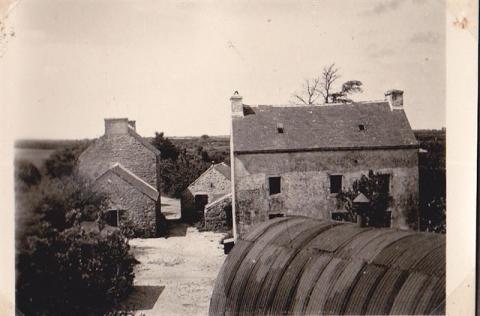
The squadron's location at Brest
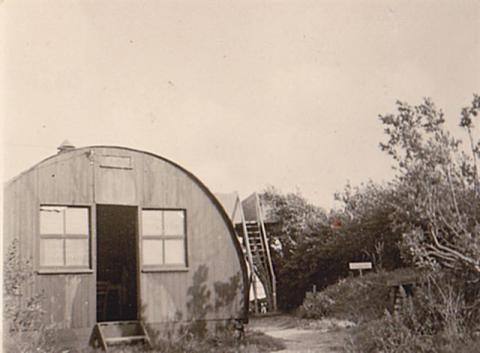
"We pilots moved from our castle to a corrugated steel hut [Nissan] a few kilometers away, so we could get more sleep."
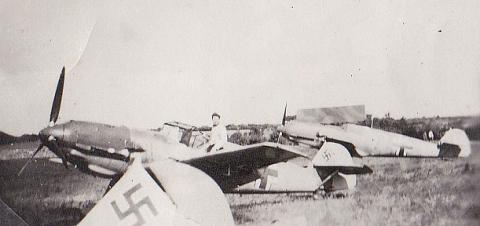
The Me 109's in readiness (Bereitschaft) at Brest, July 1941
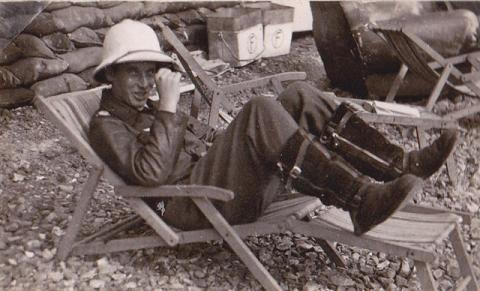
'Poldi on standby duty at Brest in August, wearing his tropical helmet
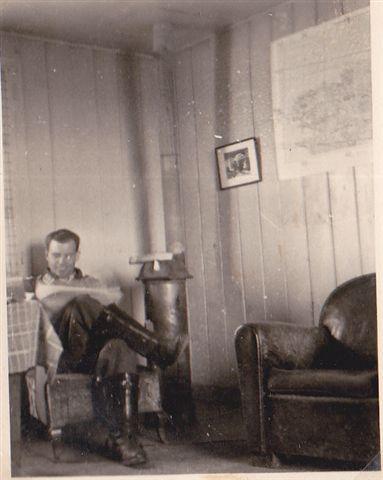
Inside the standby barrack at Brest, a pilot takes a rest
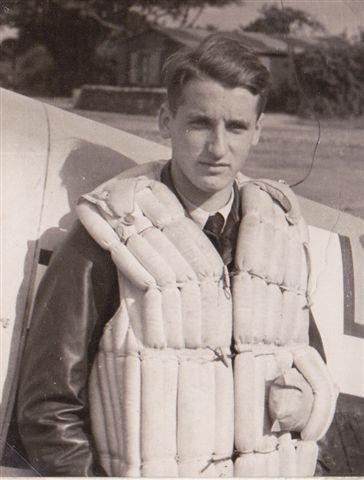
'Poldi in lifejacket, prepared to fly out over the Atlantic from Brest, 1941
22 August 1941: The day before yesterday, a few Tommies were shot down again. I flew escort for the emergency services at sea: shortly before dusk, we recovered an English lieutenant out of the Channel. He was very happy to have been saved. It was 50 kilometers off the coast, after all.
11 September 1941: Yesterday, I saw and talked to our new Commodore, Hauptmann W. Oesau. His predecessor Hauptmann Balthasar fell in aerial combat in July. Oesau now has the Oak Leaves with Swords.
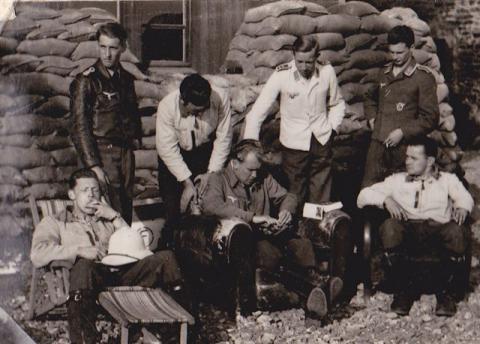
Pilots of 3 Staffel; 'Poldi standing left - August '41
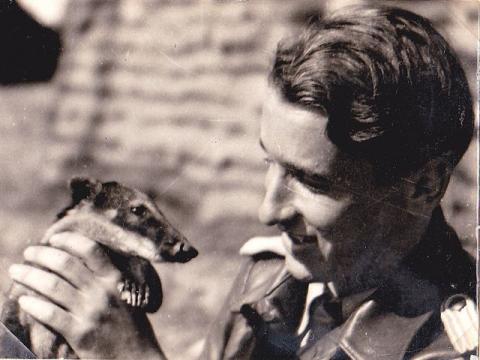
'Poldi plays with the squadron's pet Nassenbären (racoon)
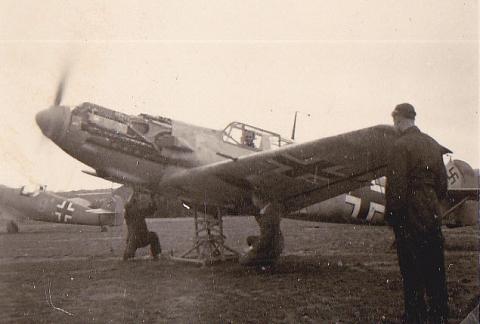
Chassis-control check in September 1941
11 October 1941: After long and serious dental treatment - I could not fly for a long time - I am now since last Sunday back overland. I flew to Caen. I am pretty well familiar with the region by now, but a flight along the coast is still the most wonderful thing, especially around Dinard. St. Malo is terrific. And then the castle Saint Michel, standing in the middle of the lake, is an impressive sight. The same afternoon I flew back with an Me 108.
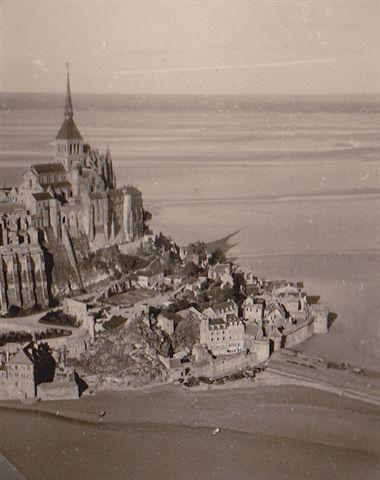
'Poldi's flyby shot of Mont St-Michal in Normandy
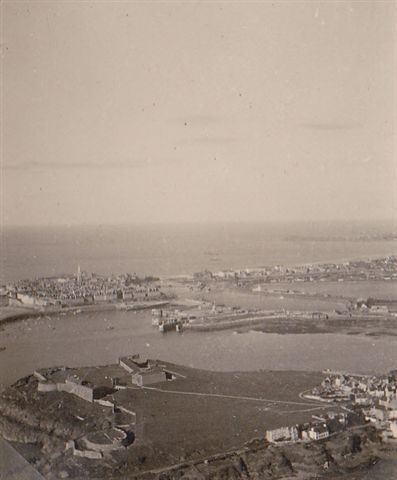
...and over the coastal town of St. Malo in October '41
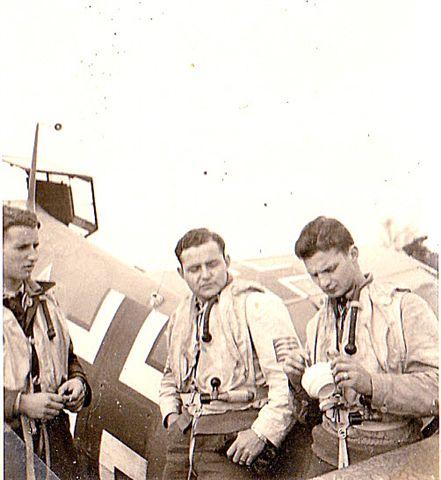
On standby at Brest, October '41
29 November 1941: In the last days, the English attacks have strengthened somewhat. But this is good because the more Tommies come, the more Tommies go down. And so, every night a few need to come and the bombs keep missing their targets. A few days ago, for the first time, I saw a U-Boat from the inside. Looks pretty restrictive in there, inside this steel tube. Those men conducting war from in there are to be admired.
13 December 1941: Two and a half hours ago, we had an English dawn bombing attack in very bad weather. We shot down two bombers. By chance we made contact with six machines over the sea, at the same time saw a Handley-Page Hampton [British medium bomber]. Can you imagine what a scrimmage that became? We fell one after the other on the Tommy and with fast, combined attacks the rest were shot up, and then the engine was on fire. For us, it was a wonderful picture. The whole thing took place at low altitude over heavy seas. The survivors are said to have escaped by parachute. When the machine was all on fire, it reared up once again before it crashed into the water. The fuel exploded and it burned quite some time on the water surface. As it was pretty dark already, the drama offered a wonderful scene for us. First the tracer of the weapons, canons and MP's, then the flames of the burning machine and the flaming waters. A pity so many of us shot the Tommy.
We experience night attacks more often now; it's always a mighty shooting spree, and naturally you can't sleep.
End of letters from 1941-
